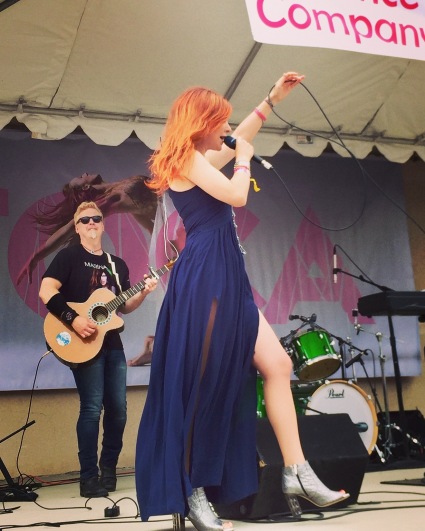
photo courtesy of Marina V
Album Review of Marina V: In V Minor
Long-time readers know Marina V is a Blog favorite. Her expressive, soaring, sweetly clear yet powerful vocals combine well with her frequently-flowing songwriting. And, while she can and does show versatility and range when she stretches herself to faster-tempo and stylistically different songs seemingly effortlessly, Marina does have a musical sweet spot. It’s a designated lane on the soaring pop ballad musical highway that’s reserved for Marina and no one else, and it’s where her legion of fans expect a majority of her music to reside. In V Minor spends most of its time in this lane, perhaps more than her recent albums do, but it’s really hard to complain, especially as she swerves around within the lane quite a bit. And it’s fun to hear Marina release an album of new material mostly within her “greatest hits” zone sometimes. Plus, there are those aforementioned cool twists she puts on her subgenre, too. With depth and darkness, most of the time, you’re not likely to expect; she always does that. She’s Marina V.

image courtesy of Marina V
The first song in the collection is the beautifully, hauntingly drawn-out “Cold Cold Winter.” Marina’s piano skills combine with the guitarwork of special guest Jim “Kimo” West and the most beautiful edge of Marina’s voice to deliver a memorable ballad.
It’s followed by the sole cover on the album, a Marina V-tempoed rendition of “We Belong,” the Pat Benatar hit that was penned by the songwriting team of Lowen and Navarro. Marina blows the lid off of this track, and it features a truly special guest, as she sings it as a duet with the song’s cowriter Dan Navarro.

photo courtesy of Marina V
Next up is another treat, a fan favorite, a rare (well, infrequent) Marina-penned full-on love song, “143.” It’s sort of the warm side of “Cold Cold Winter,” suitably placed with “We Belong” serving as a transition between the two tracks that are simultaneously similar and polar opposites. (Polar… winter… get it? Yeah, maybe not.)
“Rain My Love” opens with a semi-haunting piano, vocal, and string arrangement, a broad-sounding, soaringly-building sound that hints a bit at Scorpions’ “Wind of Change,” hinting at that sort of power but reining it in and polishing it with a softer edge. (Marina does a powerful rendition of “Wind of Change,” by the way, but it’s not on this album; it’s on Marina’s extended 2017 release of Inner Superhero.)
The power doesn’t dissipate on “Talk to You Sometimes,” it’s just redirected. Another song about strength and emotion – something Marina excels at writing and performing – this song will undoubtedly put a lump in your throat lyrically, and then it contains the best three-syllable delivery of the word “steel” I can recall, which helps release the tension. It’s all about the details.

photo courtesy of Marina V
The third weather-titled song of the first six, “Love is Like Snow,” is a bit lighter, more playful, and hopeful. Still a slow song, but one you could move around a dancefloor to if you’d like, and the occasional twirl wouldn’t be at all out of place.
Next up is one of my favorite songs on the disc, “LKD.” And fortunately, like most of us, I’m not out in public much these days, or you might be concerned when you hear me singing the lyrics under my breath, “Live. Kill. Die.” “LKD” sounds like is was specifically written for a James Bond movie, with a breathy, cold, calculated delivery. Or perhaps it was created as an entry into a competition seeking a new theme song for the KGB. I actually researched the answer to this. After noting the Bond-esque edge to the song, I checked Marina’s song notes to see what inspired this track, and indeed, as an assignment in a songwriting group, “LKD” was written to sound like an end-credit song for a James Bond movie. I’m not sure how I feel, now, knowing that it was contrived bloodlust – not the actual thing – driving this song, but I’m pretty sure the word I’m looking for is “relieved.”

photo by Justin Higuchi; photo courtesy of Marina V
Next up is another tune I often find stuck in my head, the encouraging “Back to Sunshine.” In addition to its hooks, the tune has Easter eggs for hardcore Marina V fans, as she slips old album and song titles into the lyrics of this song. It’s an neat trick, accomplishing that while writing a memorable, hopeful tune that’s engaging and catchy even without the insider information.
Marina returns to the dark side next with “Sick Sick Love.” The song cleverly builds tension and suspense musically, vocally, and lyrically, proving interestingly compelling, with just enough enthusiasm to suggest the song’s protagonist may not actually be interested in leaving this sick, sick love behind. Given the subject matter, this song is much more fun than it probably should be; I may be wrong, but I envision a mischievous glint in Marina’s eye while she recorded it.

photo by Arsen Memetov; photo courtesy of Marina V
“No Time to Say Goodbye” returns to a semi-haunting tone. It’s actually the theme song for Bill Adler Jr.’s novella of the same name, and its sad desperation rather well matches the emotion you’d expect from the book’s plot summary. (No, I haven’t read the book, but I’m intrigued.)
Finally, the album closes with two lullabies. First, “My Love Lullaby,” a sweetly encouraging song about unconditional love. And then the Russian-language “Лунная Колыбельная (Russian Moonlight Lullaby).” No, I don’t understand the song, but thanks to the translation, it’s also quite sweet, and very much a sing-to-your baby song.

photo courtesy of Marina V
That’s it. Over too soon? In V Minor is yet another dependably strong Marina V disc, as she has perfected the ability to release only top-notch material. This one, again, resides mostly within her sweet spot when it comes to tempo and taking advantage of her soaring voice and piano skills. The tone and mood ranges from very, very dark to light – to be fair, its touch is mostly soft and generally hopeful, but the breadth of emotion makes the album complex and enjoyable, like an interesting friend. Definitely a pleasure to have this disc as a listening companion during a pandemic.
Of course, as I mentioned at the beginning of this review, Marina has long been a Blog favorite. For more Blog coverage of Marina V, see my 2018 review of her album Born to the Stars. Before that, in 2015, as article #5 of my Blog-launching “Road Back to Music Journalism” series, I reviewed Marina’s Inner Superhero album and a 2014 house concert.

photo by Arsen Memetov; photo courtesy of Marina V
Looking Ahead
Marina does twice-weekly livestreams – “The Marina V Show” – on Twitch. Started during her pregnancy, Marina perfected the format well before the pandemic hit, interacting with fans via chat and playing old and new favorites. Husband/guitarist/cowriter Nick and “Baby V” make appearances, as well.
If/when live shows return, you’ll be able to find information on the “Tour” page of Marina’s website. Currently, you’ll find dates and times of the twice-weekly “Marina V Show” livestreams. Generally, Sundays at 12:30 PM PST (3:30 PM EST) and Thursdays at 7:00 PM PST (10:00 PM EST).
Marina has also been on Patreon for several years. Her “2 Songs a Month Club” gives patrons two new songs (one original and one cover) each month for as little as $1 per song ($2 per month). Of course, higher tiers offer additional membership perks.






























